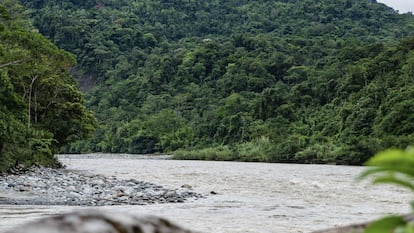The Latin American water conservation model now being adopted in Europe
An Ecuadorian program established 20 years ago and recently implemented by a British county sets the standard for basin conservation models

Water conservation should be at the forefront of global priorities. The pollution of this vital resource, coupled with issues like droughts, floods, and its escalating demand due to population growth — which is projected to double every 20 years — as well as the water-related challenges arising from climate change, pose significant hurdles for humanity. With estimations indicating that by 2025, at least two-thirds of the world’s population will live in water-stressed regions, it is imperative to devise holistic solutions that address environmental, social and economic aspects. These solutions should aim to ensure well-being and water security, focusing not only on the quantity but also the quality of water. Initiatives should begin with the preservation and revitalization of watersheds, which serve as the lifeblood of freshwater sources feeding major bodies like rivers and wetlands.
This was the goal of the Fondos de Agua (Water Funds, in English) program when it was founded 20 years ago in Quito, Ecuador. The city’s municipal water utility, in collaboration with The Nature Conservancy (TNC) and local partners, recognized the degradation of high Andean ecosystems supplying Quito’s drinking water. This initiative aims to enhance water resource management, emphasizing the preservation of natural ecosystems.
The Fondos de Agua program has inspired the creation of organizations that unite various public, private and civil society entities to enhance water security. This involves ensuring not only the quantity but also the quality of water available. These water funds play a crucial role in executing conservation efforts in key basins to secure water resources, thereby supporting the livelihoods, well-being and economic progress of millions. The initiatives under these programs are guided by scientific experts and monitoring systems to offer tailored, nature-based solutions for each specific context.
The Fondos de Agua model has successfully expanded globally, influencing strategies in the Northern Hemisphere. Its flexible and holistic approach has facilitated efficient knowledge exchange, establishing the region as a leader in nature-based solutions for ensuring water security. This model has been replicated across Latin America, a region with 32% of the world’s freshwater resources.
Currently, there are 26 water funds operating in 11 Latin American countries, with the initiative being widely adopted globally. It has expanded to the United States, Africa and Asia, and as of 2024, it has made its way to Europe. To tackle various water-related challenges in the region, the county of Norfolk in the United Kingdom launched its Strategic Water Program in February, a collaboration between the Anglian Water company, the Water Resources East organization and The Nature Conservancy.
In eastern England, a convergence of water security issues are a pressing concern for local residents. The region faces a high risk of flooding, endangering 32,000 properties. Water quality suffers from poor soil management, while future water availability is uncertain, with experts predicting demand to outstrip supply by 2050. To tackle these challenges, a £30 million ($38 million) business plan was unveiled on February 27 that focuses on nature-based solutions. Based on the Fondos de Agua model, the plan projects a nearly sevenfold return for every £1 invested, and encompasses conservation measures like permeable ponds, buffer zones and soil management. It also includes initiatives for monitoring and assessing the area’s water resources.
To address the water crisis effectively, we must grasp its complexity. There’s intense competition for water among industries like agriculture — accounting for 70% of global freshwater use — and energy producers. Coupled with the planet’s growing population and ecosystems affected by climate change, ensuring water security demands innovative strategies. These solutions should create pathways for social and economic progress, foster shareable insights, and be scalable to make a lasting impact.
Now more than ever, it is crucial to foster the exchange of experiences and best practices, nurturing collaborative efforts to tackle the challenges at hand. Facilitating the transfer of knowledge between Latin America and Europe across diverse domains like water security, agriculture, climate change, public health and more presents an avenue towards sustainable development and community well-being on a global scale.
Water, the essence of life, forms vital connections between diverse watersheds. It’s crucial to realize that water is our best investment.
Sign up for our weekly newsletter to get more English-language news coverage from EL PAÍS USA Edition
Tu suscripción se está usando en otro dispositivo
¿Quieres añadir otro usuario a tu suscripción?
Si continúas leyendo en este dispositivo, no se podrá leer en el otro.
FlechaTu suscripción se está usando en otro dispositivo y solo puedes acceder a EL PAÍS desde un dispositivo a la vez.
Si quieres compartir tu cuenta, cambia tu suscripción a la modalidad Premium, así podrás añadir otro usuario. Cada uno accederá con su propia cuenta de email, lo que os permitirá personalizar vuestra experiencia en EL PAÍS.
¿Tienes una suscripción de empresa? Accede aquí para contratar más cuentas.
En el caso de no saber quién está usando tu cuenta, te recomendamos cambiar tu contraseña aquí.
Si decides continuar compartiendo tu cuenta, este mensaje se mostrará en tu dispositivo y en el de la otra persona que está usando tu cuenta de forma indefinida, afectando a tu experiencia de lectura. Puedes consultar aquí los términos y condiciones de la suscripción digital.








































